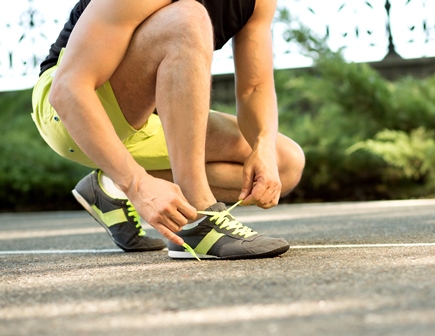WHAT IS RUNNER’S KNEE?
Runner’s knee is a type of knee pain. Despite the name, it is not necessarily caused by running. Doctors refer to this condition as patellofemoral stress syndrome (PFSS), or patellofemoral pain syndrome.
Runner’s knee can be caused by:
- overuse;
- a direct impact to the knee;
- problems with your feet;
- chondromalacia patella (broken cartilage under your kneecap);
- weak or unbalanced thigh muscles; or
- incorrect position of any bones from your hips to your ankles.
WHAT ARE THE SYMPTOMS OF RUNNER’S KNEE?
The main symptom of runner’s knee is pain. If you suffer from this condition you will most likely feel aggravation in your knee in the following conditions:
- Pain when you bend your knee to walk, squat, kneel, run, or even get up from a chair;
- Pain when walking down stairs or hills;
- Pain, typically in front of your kneecap, however, it may well be around or behind it;
- Discomfort when walking on uneven surfaces;
- Pain that increases with activity and improves with rest;
- Irritation that develops after sitting for long periods of time with the knee bent.
Other symptoms may include swelling of the area, popping sounds or a grinding feeling in the knee.

TREATMENT OF RUNNER’S KNEE
When you suffer from runner’s knee, you should never ignore the problem. First, you can address it at home and use some techniques to alleviate the pain. However, the most important treatment you should use in order to address your pain is physical therapy, as only a professional therapist can address your problem correctly, after assessing and examining your particular case.
Follow this advice by physical therapists in Cary, NC, in order to alleviate your pain:
- Rest and avoid bearing weight on the knee;
- Ice your knee for at least 20 minutes every 4 hours;
- Take an anti-inflammatory as specified by your doctor;
- Raise the knee by putting a pillow under it during rest;
- Get arch support for your shoes;
- See a physical therapist for strengthening exercises.
HOW CAN A PHYSICAL THERAPIST IN CARY HELP WHEN YOU SUFFER FROM RUNNER’S KNEE?
Physical therapy is the most common, and the most efficient form of treatment in runner’s knee. Physical therapy in Cary will help improve your posture and joint mobility, relieve pain, and help you partake in your everyday activities with less pain.
After a comprehensive evaluation, your physical therapist will analyze the findings and, if PFPS is present, your therapist will prescribe an exercise and rehabilitation program just for you. Your physical therapist in Cary may assist you in learning the following techniques to improve your quality of life:
Strengthening exercises
Your physical therapist in Cary will show you exercises targeted at the hip (particularly, the muscles of the buttock and thigh), the knee (specifically, the quadriceps muscle found on the front of your thigh that straightens your knee), and the ankle. Strengthening these muscles will aid in relieving pressure on the knee, as you conduct your activities of every day.
Stretching exercises
Your physical therapist also will select exercises to mildly stretch the muscles of the hip, knee, and ankle. Enhancing the plasticity of these muscles will help decrease any irregular pressure on the knee and kneecap.
Positional training
Based on your activity level, your physical therapist may instruct you to properly form and position your body when performing activities, such as standing up from a chair, stair climbing, squatting or jumping, to reduce redundant forces on the kneecap. This sort of training is especially efficient for athletes.
Cross-training guidance
PFPS is often caused by overuse and repeated activities. Athletes and active people can profit from a physical therapist’s guidance about proper cross-training methods to reduce stress on the knees.
Taping or bracing
Your physical therapist may choose to tape the kneecap to decrease your pain and retrain your muscles to work effectively. There are many methods of knee taping, including some varieties of tape that help adjust the kneecap and some that just give light support to irritated tissues around it. In some circumstances, a brace may be needed to keep the knee in the best position to ensure proper healing.
Electrical stimulation
Your physical therapist can prescribe treatments with mild electrical stimulation to decrease pain and help the healing process.
Activity-based exercises
If you are having difficulty performing any particular everyday activities, or are an athlete who wishes to go back to a specific sport, your physical therapist will create individualized exercises plan to restore your strength and performance levels.
Fitting for orthotics
If the alignment and position of your foot and arch seem to be adding to your knee pain, your physical therapist may provide you with special shoe inserts called orthotics. The orthotics can minimize the stress to your knee induced by low or high arches.

PHYSICAL THERAPY IN CARY, NC – FOR TREATMENT OF RUNNER’S KNEE
When you visit your PT in Cary, NC, because of your symptoms, he or she will take your medical history, and ask you to describe how your symptoms occurred, what symptoms you experienced first, and if they get worse with inactivity and better with activity.
Your physical therapist will perform a thorough evaluation of your posture, and the range of motion (movement) of your spine, hips, and knees.
Your physical therapist in Cary will then work with you to make sure that you keep your knees in their best flexibility, mobility, and muscle strength, in order to lead a productive, active life without limitations. We are here to help!
Physical therapy in Cary, Holly Springs, Garner, Raleigh, and Morrisville
For comprehensive pain and joint care in AC, you may get a referral to Raleigh Orthopaedic Therapy Services, or make an appointment on your own. The team of licensed physical therapists, licensed athletic trainers, and exercise physiologists provide world-class, cost-effective physical therapy services through our team of well-educated, experienced professionals, and support personnel.
For your convenience, physical therapy is offered at our eight clinic locations in the Triangle. To schedule a therapy appointment at one of our clinics or performance centers, please call 919-781-5600.
*Please note: Our new Cary office is opening February 4, 2019.
New address: 115 Kildaire Park Drive, Suite 102 Cary, NC 27518
source: https://www.moveforwardpt.com/SymptomsConditionsDetail.aspx?cid=f6dfe597-2f7d-4f1e-9aff-67694dca085f
The material contained on this site is for informational purposes only and DOES NOT CONSTITUTE THE PROVIDING OF MEDICAL ADVICE, and is not intended to be a substitute for independent professional medical judgment, advice, diagnosis, or treatment. Always seek the advice of your physician or other qualified healthcare provider with any questions or concerns you may have regarding your health.